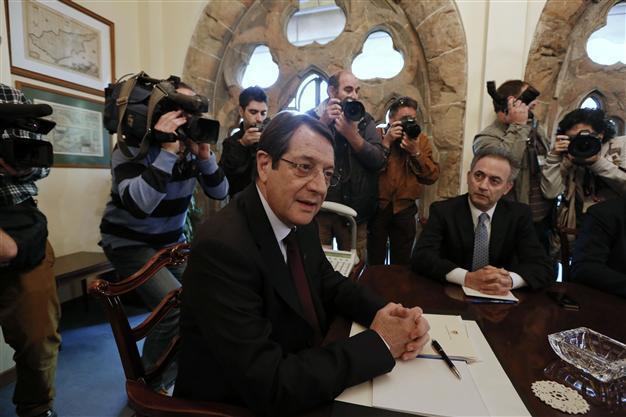Greek Cyprus throws bailout into disarray, seeks Russian help
NICOSIA – Reuters

Cyprus' President Nicos Anastasiades (C) chairs a meeting with party leaders as acting President of DYSI party Averof Neophytou (R) looks at him at the presidential palace in Nicosia March 20, 2013. REUTERS Photo
Greek Cypriot leaders held crisis talks on Wednesday to avert financial meltdown after rejecting the terms of a European Union bailout and throwing efforts to rescue the latest casualty of the euro zone debt crisis into disarray.
The rejection of an unprecedented levy on bank deposits, a condition of a 10 billion euro ($12.89 billion) EU bailout, cast the 17-nation currency bloc into uncharted waters after Greece, Portugal, Ireland, Spain and Italy all accepted biting austerity measures over the last three years to secure European aid.
President Nicos Anastasiades, barely a month in the job, gathered party leaders and the governor of the central bank at his office. He was also due to hold a cabinet meeting and talks with officials from the EU, European Central Bank and International Monetary Fund.
Finance Minister Michael Sarris, however, was in Moscow, amid mounting speculation that Russia could step in with a rescue plan to safeguard high levels of Russian deposits in Greek Cypriot banks.
Greek Cyprus has asked Russia for a five-year extension of an existing loan of 2.5 billion euros that matures in 2016, and a reduction in the 4.5 percent interest rate.
Sarris told reporters in Moscow: "We're hoping for a good outcome, but we cannot really predict."
Anastasiades spoke with Russian President Vladimir Putin by phone on Tuesday after the island's tiny legislature threw out the proposed tax by 36 votes to 0 with 19 abstentions, to the cheers of demonstrators.
The stock exchange and banks remained closed.
Outraged Greek Cypriots had emptied cash machines at the weekend after news broke that they would be taxed on their savings to raise 5.8 billion euros in exchange for the bailout, breaking a taboo in Europe's handling of the stubborn debt saga so far.
The crisis is unprecedented in the history of the east Mediterranean island of 1.1 million people, which suffered a war and ethnic split in 1974 in which a quarter of its population was internally displaced.
While Brussels has emphasised that the tax measure was a one-off for a country that accounts for just 0.2 percent of Europe's output, fears have grown that savers in other, larger European countries might be spurred to withdraw funds.
Even the Church of Greek Cyprus offered to help.
"The entire wealth of the Church is at the disposal of the country ... so that we can stand on our own two feet and not on those of foreigners," Archbishop Chrysostomos said after meeting Anastasiades early on Wednesday,
The Church of Cyprus is a major shareholder in Cyprus's third-largest domestic lender, Hellenic Bank
Gas deposits
Leaders of the currency union said the bailout offer still stood, provided the conditions were met.
The European Central Bank had threatened to end emergency lending assistance for teetering Greek Cypriot banks, crippled by their exposure to the financial crisis in neighbouring Greece.
"The ball is in Cyprus's court," Dutch Finance Minister Jeroen Dijsselbloem, who chairs the euro zone group of finance ministers, said after Tuesday's vote.
Euro zone paymaster Germany, facing an election this year and increasingly frustrated with the mounting cost of bailing out its southern partners, said Greek Cyprus had no one to blame but itself for the gravity of the situation.
"For an aid programme we need a calculable way for Cyprus to be able to return to the financial markets. For that, Cyprus's debts are too high," said Germany's finance minister, Wolfgang Schaeuble.
With Sarris in Moscow, there was mounting speculation that Russia might seek to exploit the crisis, having reacted angrily to the proposed bank levy.
Some reports suggested Russian oil and gas behemoth Gazprom had mooted its own assistance plan, in exchange for exploration rights to Greek Cyprus's offshore gas deposits.
Noble Energy reported a natural gas recovery of 5 to 8 trillion cubic feet of gas south of Greek Cyprus in late 2011, in the island's first foray to tap offshore resources.
Russian authorities have denied the Kremlin plans to offer more money.
An important issue in negotiations has been the high level of deposits held in the island's banks by non-EU citizens and companies, notably from Russia, where Greek Cyprus has established itself as a major provider of offshore financial services.
An influx of Russian money and influence since the collapse of the Soviet Union has led some Brussels officials to complain privately that Greek Cyprus acts at times as a "Trojan donkey" for Moscow inside the European Union since it joined in 2004.
